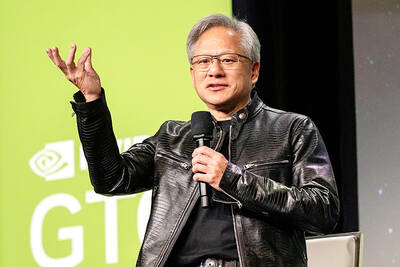EQUITIES
Asian markets mostly higher
Asian and European markets mostly rose yesterday as investors kept an eye on the talks to raise the US debt limit to avert a “catastrophic” default. There has been some progress on reaching a deal, but Democrats and Republicans remain at loggerheads, although US President Joe Biden said he was confident the debt ceiling would be raised. In Taipei, the TAIEX closed down 27.31 points, or 0.18 percent, at 15,475.05, with turnover of NT$189.128 billion (US$6.14 billion). Elsewhere in Asia, Tokyo, Hong Kong, Shanghai, Sydney, Seoul, Singapore and Mumbai rose, although there were losses in Manila and Jakarta. London, Paris and Frankfurt were all up in the morning as the EU lifted its economic growth forecast for this year.
EQUITIES
Foreigners are net sellers
Foreign institutional investors last week sold a net NT$7.74 billion of local shares after selling a net NT$9.33 billion the previous week, the Taiwan Stock Exchange said in a statement yesterday. The top three shares sold by foreign investors last week were EVA Airways Corp (長榮航空), Innolux Corp (群創) and Shin Kong Financial Holding Co (新光金控), while the top three bought were Tatung Co (大同), Compal Electronics Inc (仁寶) and E.Sun Financial Holding Co (玉山金控), the exchange said. As of Friday last week, foreign investors had bought NT$153.97 billion of local shares since the beginning of this year, while the market capitalization of shares held by foreign investors was NT$19.38 trillion, or 39.85 percent of total market capitalization, it said.
EQUITIES
TIB accounts up to 190,000
The number of “Qualified Investors” on the Taiwan Innovation Board (TIB) soared to 190,000 accounts as of the end of last month, the Taiwan Stock Exchange said in a statement yesterday. That is up from nearly 90,000 accounts a year earlier. The TIB is the exchange’s new trading board for start-ups focused on the Internet of Things and artificial intelligence, as well as promising biotechnology companies and firms that produce key components. Three companies are now trading their shares on the TIB, the exchange said. To further promote the new board, the exchange plans to give away six iPhones each month through December via lucky draws, and participants in the draws could also win a Gogoro electric scooter after the number of accounts exceeds 200,000, it said.
FINANCIAL SERVICES
Shin Kong posts Q1 loss
Shin Kong Financial Holding Co (新光金控) posted a net loss of NT$9.1 billion in the first quarter of the year, making it the only local financial holding company remaining in the red during the January-to-March period. That came as the company’s life insurance arm, Shin Kong Life Insurance Co (新光人壽), posted a net loss of NT$11.3 billion in the quarter, the largest quarterly loss in more than five years. The financial holding company plans to raise NT$16.4 billion of new funds in the second half of this year to improve the capital structure of its flagship insurance unit. The insurer might also consider disposing of some assets to boost its capital adequacy ration. Shin Kong Life’s bottom line deteriorated due to losses on foreign corporate bonds and foreign exchange, while the high costs of high-yield insurance policies also dragged on its profitability, its parent company said.

‘DECENT RESULTS’: The company said it is confident thanks to an improving world economy and uptakes in new wireless and AI technologies, despite US uncertainty Pegatron Corp (和碩) yesterday said it plans to build a new server manufacturing factory in the US this year to address US President Donald Trump’s new tariff policy. That would be the second server production base for Pegatron in addition to the existing facilities in Taoyuan, the iPhone assembler said. Servers are one of the new businesses Pegatron has explored in recent years to develop a more balanced product lineup. “We aim to provide our services from a location in the vicinity of our customers,” Pegatron president and chief executive officer Gary Cheng (鄭光治) told an online earnings conference yesterday. “We

LEAK SOURCE? There would be concern over the possibility of tech leaks if TSMC were to form a joint venture to operate Intel’s factories, an analyst said Taiwan Semiconductor Manufacturing Co (TSMC, 台積電) yesterday stayed mum after a report said that the chipmaker has pitched chip designers Nvidia Corp, Advanced Micro Devices Inc and Broadcom Inc about taking a stake in a joint venture to operate Intel Corp’s factories. Industry sources told the Central News Agency (CNA) that the possibility of TSMC proposing to operate Intel’s wafer fabs is low, as the Taiwanese chipmaker has always focused on its core business. There is also concern over possible technology leaks if TSMC were to form a joint venture to operate Intel’s factories, Concord Securities Co (康和證券) analyst Kerry Huang (黃志祺)

It was late morning and steam was rising from water tanks atop the colorful, but opaque-windowed, “soapland” sex parlors in a historic Tokyo red-light district. Walking through the narrow streets, camera in hand, was Beniko — a former sex worker who is trying to capture the spirit of the area once known as Yoshiwara through photography. “People often talk about this neighborhood having a ‘bad history,’” said Beniko, who goes by her nickname. “But the truth is that through the years people have lived here, made a life here, sometimes struggled to survive. I want to share that reality.” In its mid-17th to

‘MAKE OR BREAK’: Nvidia shares remain down more than 9 percent, but investors are hoping CEO Jensen Huang’s speech can stave off fears that the sales boom is peaking Shares in Nvidia Corp’s Taiwanese suppliers mostly closed higher yesterday on hopes that the US artificial intelligence (AI) chip designer would showcase next-generation technologies at its annual AI conference slated to open later in the day. The GPU Technology Conference (GTC) in California is to feature developers, engineers, researchers, inventors and information technology professionals, and would focus on AI, computer graphics, data science, machine learning and autonomous machines. The event comes at a make-or-break moment for the firm, as it heads into the next few quarters, with Nvidia CEO Jensen Huang’s (黃仁勳) keynote speech today seen as having the ability to